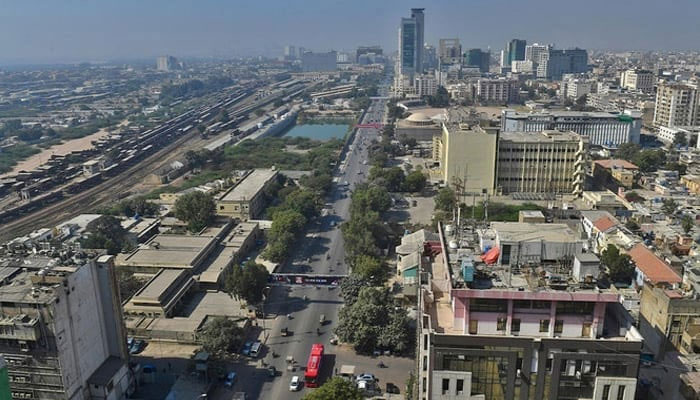City of crime
While police insist they have zero-tolerance policy toward vigilante justice, their inaction speaks otherwise
It is both alarming and fascinating how Karachi has spiraled into a black hole of lawlessness and chaos. While the city’s many issues can be addressed with a sense of urgency, the authorities appear indifferent. Last week, an enraged mob in the Quaidabad area lynched an armed robber after he shot and killed a trader during a failed robbery attempt. According to reports, the robber opened fire when the trader and his team resisted. While the police insist they have a zero-tolerance policy toward vigilante justice, their inaction speaks otherwise. In separate incidents, three more robbers were shot dead during attempted robberies. Shockingly, in the month of Ramazan alone (which began on March 2), citizens have killed at least five robbers. Since the beginning of the year, at least 19 people have lost their lives to street crime in Karachi.
Street crime is an unfortunate reality in large cities, especially as growing populations struggle over scarce resources. However, the rising trend of people taking the law into their own hands is a direct consequence of the authorities’ failure to curb crime. For years, Karachi has been plagued by street criminals who operate with impunity. From bustling markets to quiet residential neighbourhoods, no area is safe from trigger-happy robbers who do not hesitate to kill. Instead of taking decisive action against them, law-enforcement agencies have urged citizens not to resist and simply hand over their valuables. This response raises serious questions about the police’s ability -- or willingness -- to combat crime effectively.
Pakistan’s ongoing economic crisis has only exacerbated the situation. While its impact has been felt across the board, the working class and the poor have suffered the most. Analysts have repeatedly warned that the country’s worsening economic divide is fueling criminal activity, with organised crime networks exploiting vulnerable individuals. The problem is further compounded by the lack of witness protection for those who report crime. Fear of retaliation forces many complainants to withdraw their cases, leaving the police with little choice but to release arrested criminals. Without an effective rehabilitation programme, these offenders inevitably return to a life of crime. This persistent lawlessness has stripped Karachi of its potential. A city that should be thriving with night markets and public events instead remains eerily silent after dark. The trauma of encountering an armed robber is something almost every Karachiite carries -- if not firsthand, then from the endless stream of mugging footage on social media. This growing sense of fear and helplessness is unacceptable. Law-enforcement agencies must devise and implement a foolproof plan to restore safety and security so that Karachi can reclaim its lost glory. Without immediate and effective action, the city will continue its descent into chaos, leaving its residents to fend for themselves in a lawless battleground.
-
 King Charles Holds Emergency Meeting After Andrew Arrest: 'Abdication Is Not Happening'
King Charles Holds Emergency Meeting After Andrew Arrest: 'Abdication Is Not Happening' -
 Amazon Can Be Sued Over Sodium Nitrite Suicide Cases, US Court Rules
Amazon Can Be Sued Over Sodium Nitrite Suicide Cases, US Court Rules -
 'Vikings' Star Mourns Eric Dane's Death
'Vikings' Star Mourns Eric Dane's Death -
 Patrick Dempsey Reveals Eric Dane's Condition In Final Days Before Death
Patrick Dempsey Reveals Eric Dane's Condition In Final Days Before Death -
 'Heartbroken' Nina Dobrev Mourns Death Of Eric Dane: 'He'll Be Deeply Missed'
'Heartbroken' Nina Dobrev Mourns Death Of Eric Dane: 'He'll Be Deeply Missed' -
 Andrew Mountbatten-Windsor’s Arrest: What Happened When A Royal Was Last Tried?
Andrew Mountbatten-Windsor’s Arrest: What Happened When A Royal Was Last Tried? -
 Alyssa Milano Expresses Grief Over Death Of 'Charmed' Co-star Eric Dane
Alyssa Milano Expresses Grief Over Death Of 'Charmed' Co-star Eric Dane -
 Prince William, Kate Middleton Camp Reacts To Meghan's Friend Remarks On Harry 'secret Olive Branch'
Prince William, Kate Middleton Camp Reacts To Meghan's Friend Remarks On Harry 'secret Olive Branch' -
 Daniel Radcliffe Opens Up About 'The Wizard Of Oz' Offer
Daniel Radcliffe Opens Up About 'The Wizard Of Oz' Offer -
 Channing Tatum Reacts To UK's Action Against Andrew Mountbatten-Windsor
Channing Tatum Reacts To UK's Action Against Andrew Mountbatten-Windsor -
 Brooke Candy Announces Divorce From Kyle England After Seven Years Of Marriage
Brooke Candy Announces Divorce From Kyle England After Seven Years Of Marriage -
 Piers Morgan Makes Meaningful Plea To King Charles After Andrew Arrest
Piers Morgan Makes Meaningful Plea To King Charles After Andrew Arrest -
 Sir Elton John Details Struggle With Loss Of Vision: 'I Can't See'
Sir Elton John Details Struggle With Loss Of Vision: 'I Can't See' -
 Epstein Estate To Pay $35M To Victims In Major Class Action Settlement
Epstein Estate To Pay $35M To Victims In Major Class Action Settlement -
 Virginia Giuffre’s Brother Speaks Directly To King Charles In An Emotional Message About Andrew
Virginia Giuffre’s Brother Speaks Directly To King Charles In An Emotional Message About Andrew -
 Reddit Tests AI-powered Shopping Results In Search
Reddit Tests AI-powered Shopping Results In Search




